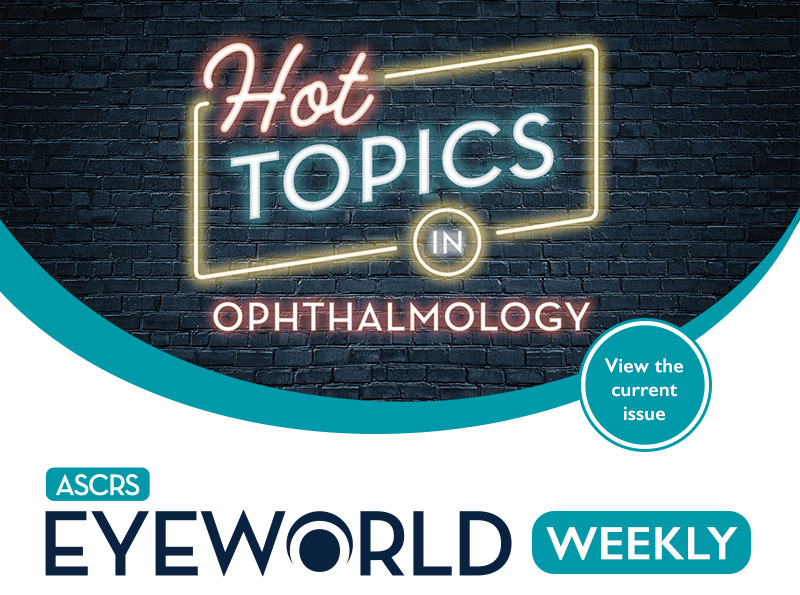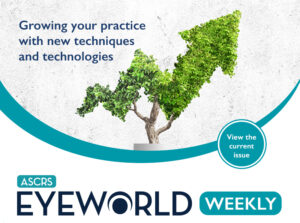FDA accepts NDA for pupil dilation spray
Eyenovia announced that the FDA accepted its NDA for MydCombi, an ophthalmic spray that induces mydriasis with tropicamide and phenylephrine. The spray is intended to be administered in office with the company’s Optejet drug delivery technology. According to the company’s press release, the Prescription Drug User Fee Act target action date is May 8, 2023.
NDA for new glaucoma drug accepted
The FDA accepted Visiox Pharma’s NDA for PDP-716 (brimonidine tartrate) for treatment of glaucoma. The Prescription Drug User Fee Act target action date is August 4, 2023. If approved, this would be the first once-daily brimonidine drop in the glaucoma market, according to the company’s press release.
PMA application submitted to FDA for new IOL
CORD submitted a Premarket Approval (PMA) application to the FDA for its Model SC9 IOL. This IOL, according to the company’s press release, has a single focus, spherical optic with a rigid structure for a consistent position that is meant to provide more intermediate vision than a typical monofocal IOL. The IOL has been implanted in more than 300 patients who have been followed for at least a year under an investigational device exemption.
Data report: 12-month efficacy seen from single mechanical MGD treatment
Sight Sciences reported that its TearCare system, which provides heat to the meibomian glands followed by manual expression, saw efficacy out to 12 months after a single treatment. According to the company’s press release, 78 patients with dry eye (156 eyes) participated in the single-center, retrospective, investigator-initiated study. The data showed a 44% decrease in dry eye symptoms from baseline at week 8, according to the press release, with some benefits maintained for as long as 18 months after treatment. A decrease of 6.2 points, on average, for SPEED scores was observed by 8 weeks and maintained up to 12 months post-treatment. Meibomian gland expression scores increased by 4 points from baseline and stayed at least 3 points higher from baseline during the 12 months post-treatment, according to the company.
Acquisition of company developing drugs for rare ophthalmic diseases
Amgen announced that it is in the process of acquiring Horizon Therapeutics. Horizon is the developer of Tepezza (teprotumumab-trbw), an FDA-approved treatment for thyroid eye disease, and Uplizna (inebilizumab-cdon), an FDA-approved treatment for neuromyelitis optica spectrum disorder.
ASCRS news and events
- ASCRS Annual Meeting: Register for the ASCRS Annual Meeting, May 5–8, 2023, in San Diego, California.
- Annual Meeting submission opportunity: Three symposia at the ASCRS Annual Meeting are seeking video case submissions. Find more information here.
- New EyeWorld issue: EyeWorld is rolling out its December issue articles online. The issue is also posted as a flipbook here. Check out the ‘Hot topics in ophthalmology’ covered in this issue.
Research highlights
- A retrospective study that included 206 eyes (130 patients) with open-angle glaucoma evaluated the long-term safety and efficacy of canaloplasty in lowering IOP and reducing use of IOP-lowering medications. The research, published in the Journal of Cataract & Refractive Surgery, used the VISCO360 (Sight Sciences) or OMNI Surgical System (Sight Sciences) in 22 eyes as a standalone procedure and concomitantly with cataract surgery in 185 eyes. Preop, these eyes had IOP that was not well controlled with or were intolerant to IOP-lowering medications. According to the study, the preoperative mean IOP in Group 1 (defined as having an IOP of >18 mm Hg) and Group 2 (defined as ≤18 mm Hg) was 21.1±8.8 mm Hg, with a mean of 2.0±0.9 glaucoma drops. Efficacy for Group 1 was a reduction in IOP and IOP-lowering drops, while Group 2 efficacy was maintenance of a lower IOP and reduction in medication use, according to the paper. The authors reported meeting these endpoints in 73% of patients. With this, the authors concluded that canaloplasty, either alone or with cataract surgery, is “a safe, tissue-sparing, and effective minimally invasive glaucoma surgery” that can result in “significant, consistent, and clinically meaningful reductions in IOP and use of IOP-lowering medications.”
- A prospective registry study from the Netherlands sought to identify risk factors for rebubbling and early graft failure in DMEK surgery. The study published in the British Journal of Ophthalmology included 752 consecutive DMEK procedures from the Netherlands Organ Transplant Registry, 144 of which underwent rebubbling. Of the 144 eyes, rebubbling was successful in 101 eyes (70% of cases). Graft failure rate overall, the authors found, was significantly higher in eyes that required rebubbling (30%) compared to those that did not (9%). According to the paper, eyes that had rebubbling had significantly lower endothelial cell densities at 3, 6, and 12 months compared to those that didn’t need rebubbling. The authors conducted multivariable analysis and found that the independent risk factors for rebubbling included surgical complications and older recipient age.
Product news
- Harrow entered into an agreement to acquire the following products from Novartis: ILEVRO (nepafenac ophthalmic suspension), NEVANAC (nepafenac ophthalmic suspension), VIGAMOXΩ (moxifloxacin hydrochloride ophthalmic solution), MAXIDEX (dexamethasone ophthalmic suspension), and TRIESENCE (triamcinolone acetonide injectable suspension). According to the company’s press release, the $130 million transaction is expected to close in the first quarter of 2023 with a 6-month NDA transfer period during which time Novartis will sell the products in the U.S. with profits transferred to Harrow. After this time, Harrow will assume marketing and manufacturing of the products. Novartis retains the rights to the products outside the U.S.
- NIDEK launched the Fully Assisted Refraction System (FARS) as an optional kit for its TS-610 NIDEK Tabletop Refraction System. FARS is designed to determine full refractive correction based on patient responses using objective data or spectacle prescription as the starting point, according to the company’s press release.
This issue of EyeWorld Weekly was edited by Stacy Jablonski and Liz Hillman.
EyeWorld Weekly (ISSN 1089-0319), a digital publication of the American Society of Cataract and Refractive Surgery (ASCRS), is published every Friday, distributed by email, and posted live on Friday.
Medical Editors: Sumit “Sam” Garg, MD, Chief Medical Editor; Rosa Braga-Mele, MD, Cataract Editor; Clara Chan, MD, Cornea Editor; Nathan Radcliffe, MD, Glaucoma Editor; and Vance Thompson, MD, Refractive Editor
For sponsorship opportunities or membership information, contact: ASCRS • 12587 Fair Lakes Circle • Suite 348 • Fairfax, VA 22033 • Phone: 703-591-2220 • Fax: 703-591-0614 • Email: ascrs@ascrs.org
Mention of products or services in EyeWorld Weekly does not constitute an endorsement by ASCRS.
Click here to view our Legal Notice.
Copyright 2022, EyeWorld News Service, a division of ASCRSMedia. All rights reserved.



